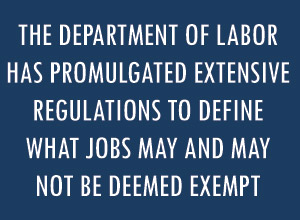 The difference between exempt and non-exempt employees was briefly mentioned in the last issue’s article on the Fair Labor Standards Act. The FLSA, 29 U.S.C. § 201 et seq., requires that most employees be paid for every hour worked. Further, if an employee has worked more than forty hours in one week, normally the employee must be paid at the rate of one and a half times the usual rate for that time over forty hours. In the case of public employers, compensatory time may be substituted for monetary pay. The time and a half rate for compensation does not apply until and unless there has actually been more than forty hours worked. If an employee has worked three ten hour days, and then took a vacation day of eight hours, followed by an eight hour work day, the employee would be counted as only working thirty-eight hours. The employer would not be legally required to pay at the time and a half rate for the extra hours worked because the vacation time does not count towards the “forty hours in a week” threshold.
The difference between exempt and non-exempt employees was briefly mentioned in the last issue’s article on the Fair Labor Standards Act. The FLSA, 29 U.S.C. § 201 et seq., requires that most employees be paid for every hour worked. Further, if an employee has worked more than forty hours in one week, normally the employee must be paid at the rate of one and a half times the usual rate for that time over forty hours. In the case of public employers, compensatory time may be substituted for monetary pay. The time and a half rate for compensation does not apply until and unless there has actually been more than forty hours worked. If an employee has worked three ten hour days, and then took a vacation day of eight hours, followed by an eight hour work day, the employee would be counted as only working thirty-eight hours. The employer would not be legally required to pay at the time and a half rate for the extra hours worked because the vacation time does not count towards the “forty hours in a week” threshold.
Exempt employees are employees who are exempt from the normal requirements of the Fair Labor Standards Act. Employers are neither required to pay for every hour worked for exempt employees, nor to pay the premium overtime rate of time and a half ever. Exempt employees are paid on a salary basis in which they receive the same pay regardless of how many hours they do or do not work in a week. If an employer wishes to give extra compensation, the employer may, but the employer is not legally required to do so.
There are several different categories of exempt employees, and the Department of Labor has promulgated extensive regulations to define what jobs may and may not be deemed exempt from the FLSA. What is not a test for exempt versus non-exempt? Your own assessment of how important the employee is to you does not determine whether the employee is exempt or not. How willing the employee is to work overtime does not make the employee exempt. A non-exempt employee cannot donate time to the employer.
In the courtroom setting, most bailiffs, court reporters, probation officers, and clerks will be non-exempt employees. There are “white-collar” exceptions that may apply to a court: the professional, the administrative, the executive, and certain computer personnel. Each one of these exempt categories will be discussed herein. It is vital to know whether a job is an exempt or non-exempt job. Exempt jobs will normally be the positions with high pay, significant responsibilities that must be completed regardless of the time it takes, and a high degree of independent decision-making. For such employees, the court budget could have a needless, serious negative impact if the exempt employee was misclassified as a non-exempt position. On the other hand, treating a non-exempt employee as an exempt employee is a violation of the FLSA with serious legal and financial consequences.
Professional exempt employees perform work in a field requiring knowledge of an advanced type. The advanced knowledge must be in a field of science or learning and the advanced knowledge must be customarily acquired through a prolonged course of specialized intellectual instruction. Fields recognized by the Department of Labor as traditional professions in the fields of science and/or learning are law, medicine, theology, accounting, actuarial computation, engineering, architecture, teaching, pharmacy, and various types of physical, chemical and biological sciences. This list is neither exclusive nor definitive. For example, a bookkeeper who simply tabulates data will not be an exempt employee, even if the bookkeeper is given the title and rank of accountant and has a business degree. The primary duty of such a bookkeeper does not require knowledge of an advanced type.
Executive exempt employees are those with a primary duty of managing the business or a recognized department or subdivision of the business. To meet this test, at a minimum the executive employee must supervise at least two other persons. The executive employee must also either have the authority to hire and fire employees, or his/her suggestions and recommendations must be given particular weight in hiring and firing decisions. The definition of management is not limited to supervision of other employees, but the supervision of others is a minimum requirement for this exempt category. The executive employee must have management in general as his/her primary duty.
Administrative exempt employees are those employees whose primary duty consists of the office work directly related to the management or general business operations of the employer. For this exemption, it must be determined whether the employee is primarily working on the employer’s operation needs, or rather in the business function of the employer. In the court setting, an employee whose primary duty is keeping track of cases, scheduling, recording cases, and otherwise dealing with the functions of the court in dispensing justice will not be an administrative employee. An administrative exempt employee may at times work in these areas, but the administrative exempt employee’s primary duty will be in business operations instead. Business operations are such areas as human resource management, budgeting, regulatory compliance, purchasing, and auditing. In addition to the requirement to have the primary duty as administrative, the administrative exempt employee must regularly exercise discretion and independent judgment in matters of significance.

The category of computer professional is a tricky area in the FLSA. At one time, computer work seemed so abstruse and specialized that all who worked on computers in any aspect were considered exempt. This is no longer accepted by the Department of Labor. To meet the computer professional test, the worker must have a primary duty that consists of application of systems analysis techniques and procedures; design, development, analysis, creating, testing or modification of computer systems or programs based on or related to the user or system design specifications; design, documentation, testing, creation or modification of computer programs related to machine operating systems, or a combination of the above. Such computer jobs as help desk personnel, instructors of software programs, and software technicians are not going to meet this test. Because the computer professional exemption is constantly being revised and is not always clear-cut, an employer should get an opinion from an attorney who practices in the area of employment law before classifying any computer staff as exempt.
Each of the exempt status exceptions hinges upon a determination of the primary duty of the employee. It has often been said that the primary duty of an employee is the one that takes up fifty percent or more of the employee’s time. However, this is not necessarily true; the answer is more complex than a time formula test. For the purpose of the FLSA, each employee has only one primary duty although that will be a broad duty. An employee who has a primary duty of either managing employees or administering office operations is an exempt employee, although the employee is also engaging in non-exempt activities. For example, many chief probation officers are executive exempt employees, even though they carry a partial caseload. Not all are exempt however. The determination is made by analyzing whether the primary duty of the employee is the exempt function or a non-exempt function.
The amount of time that an employee spends in particular duties is only one guideline in determining what the employee’s primary duty is. The other three factors set forth in 29 CFR § 541.700 are the relative importance of the exempt duties; the employee’s relative freedom from direct supervision; and the relationship between the employee’s salary and the wages paid to other employees. The relative importance refers to the importance of the exempt-type duties in that particular employee’s value to the employer, versus the importance of the non-exempt duties to the employer. A working foreman is not an exempt employee. An employee who assists the court with seeking grants, making required reports, preparing inventory, supervising other court staff, and assessing and implementing court operational needs, but who also assists in entering data in the court files, may well be an exempt executive or administrative employee. The other two factors in the test for primary duty are easier to analyze: how much freedom does the individual have to make his/her own discretionary decisions, and is the salary paid the individual commensurate with non-exempt staff or is it significantly higher?
This analysis is only a thumb-nail sketch of the FLSA law on exempt or non-exempt employees. It is provided as a tool for thought, rather than a resource to make an ultimate determination. Before any employer elects to treat an employee as exempt, an individual opinion from a qualified attorney should be sought first.
 Trial courts can seek advice on exempt status for employees by contacting Brenda Rodeheffer directly at (317) 234-3926 or
Trial courts can seek advice on exempt status for employees by contacting Brenda Rodeheffer directly at (317) 234-3926 or